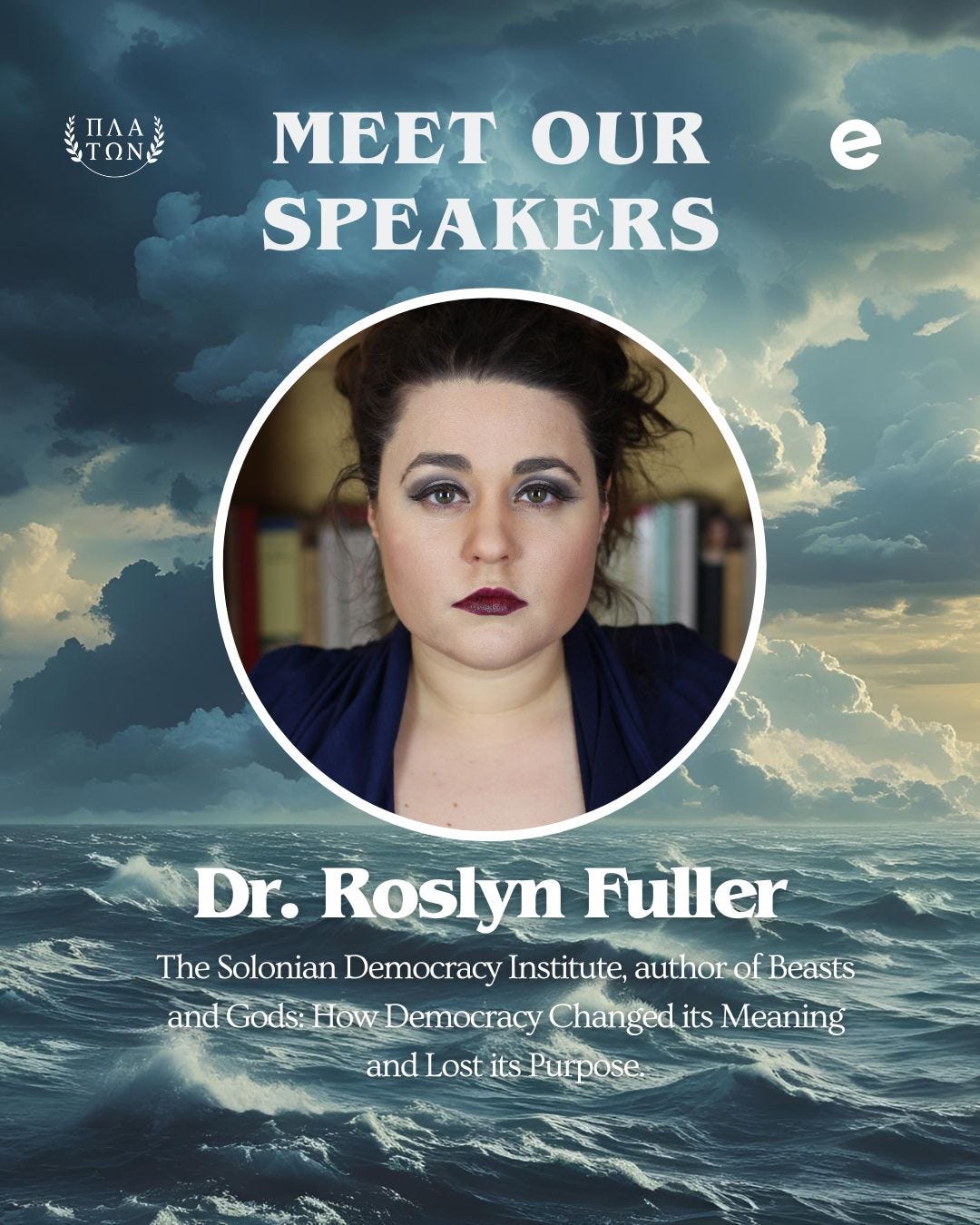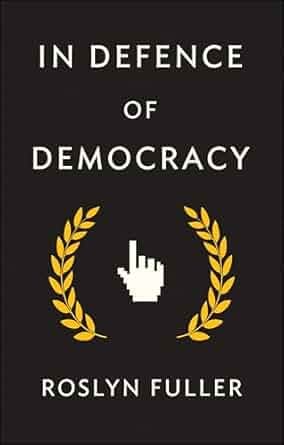From Athens to AI: How Direct Democracy Could Fix Modern Politics
An interview with Dr. Roslyn Fuller
Dr. Roslyn Fuller is a political philosopher, former university lecturer, and an expert on electoral systems, historical democracy and digital democracy who now heads the Dublin-based Solonian Democracy Institute. The author of five books, including the Orwell Prize-nominated Beasts and Gods: How Democracy Changed Its Meaning and Lost Its Purpose (Zed Books, 2015) and In Defence of Democracy (Polity, 2019), Roslyn frequently contributes to print, radio and broadcast media (BBC, Forbes, The Nation, Los Angeles Review of Books, etc.) on issues relating to democracy as well as to international law. Born in Canada, she wrote her bar exams with a specialization in public international law in Lower Saxony, Germany before moving to Ireland to write her PhD at Trinity College, Dublin.
How did you first become interested in Philosophy and democracy?
What got me into the classics section of the library was the need to come up with a working definition of democracy while writing my PhD. I soon found the processes of ancient Athenian democracy so different from our own that I became fascinated with most of the ancient world, really.
Writers in antiquity tended to focus tightly on their core argument and to continually return to first principles. This was pivotal to their – and my – understanding of democracy, not as a catalogue of rights and material well-being, but rather as a system defined by the identity of those who hold the decision-making authority – in the case of democracy, the collective citizens.
Also, contrary to the popular perception, it’s also just enjoyable to read ancient texts. There’s something kind of whimsical about people who laid a goodly chunk of our mathematical foundations, calculated the circumference of the earth using a couple of sticks, and yet also decided a good use of their time would be to devise aerial rigging so that they could fly entertainers around the stage during theatrical performances.
Any religion or ethical philosophy has as its mission the improvement of human beings, including first and foremost oneself.
Tell us about In Defence of Democracy.
Many ancient Greeks felt themselves to be afflicted by sophists – paid teachers who taught clever, but ultimately deceptive and morally vacuous reasoning. The chief arena of Athenian democracy was the Assembly where people engaged in oral debate before voting on measures, so as you can imagine, anyone who went around teaching people to use cheap rhetoric tricks was regarded as a problem.
My aim with writing In Defence of Democracy was to counteract the sophists of our time, those whose aim it is to convince people to give up on democracy using similar cheap tricks that, on closer examination, don’t hold water.
I wrote this book in the aftermath of the Brexit referendum and first Trump election in 2016, events that blindsided many people who had considered themselves to be political experts. Rather than engaging in appropriate introspection, they externalized blame and looked for ways to invalidate votes for policies or politicians they disliked. The arguments here quickly became bizarre. At one point, two celebrated political scientists even wrote a highly-cited book alleging that Americans change their votes based on shark attacks.
From there, an entire cottage industry of ‘solutions’ to the problem of democracy took off, ranging from instituting voter tests (as Black Americans were subjected to under Jim Crow laws), to randomly selecting a few people to advise the government in Soviet-style closed chambers, to simply dismissing votes on the basis that people only participated politically as a factor of their identity without individualized thought (and thus their thoughts could and should be ignored).
My mission with In Defence of Democracy was to show the specious nature of these arguments, which were often predicated on cherry-picked data, wilfully exaggerated interpretations of the evidence and circular logic. I think of myself as a Dis-Illusionist – I show people how the trick is getting played on them.
I think this is where we pick up on Stoicism and similar systems of morality. Any religion or ethical philosophy has as its mission the improvement of human beings, including first and foremost oneself. But that does require the practitioner to believe that humans can be improved and that there is an inherent worth in every human who has the potential to live a free life.
I think our society has really gone down a wrong turn in equating intelligence with cynicism and fatalistic hopelessness, and that’s reflected in this negative drive to give up on democracy. That kind of morally bankrupt idea with a veneer of intellectualism is exactly what sophistry is.
Direct democracy is a self-correcting system, because it is inherent in it that if a policy achieves some unwished for result, you can easily amend it.
Given your work blending ancient Athenian democracy with modern technology, what do you see as the most critical unintended consequence—positive or negative—of digitizing direct democracy, and how can societies prepare for it?
That is a somewhat complicated question, because in the vast majority of places on earth, there currently isn’t any direct democracy to digitize. Only a few places like Switzerland, Ireland and California have any elements of direct democracy at all, and even those are rudimentary compared to what was going on in ancient Athens. So, I think it is the direct aspect, rather than the digital aspect that is more relevant here, and in order to put the unintended consequences in perspective, I think we have to first briefly look at the intended ones.
The intended consequence is to recalibrate political and economic power in our society by spreading political decision-making across all citizens and giving their decisions unmediated effect. The reason for doing this is that it helps to eliminate distortions in the political process which are often a vehicle for corruption or for thwarting or delaying action to the point of depriving it of effectiveness.
The post-War system of rights and elections – modern representative democracy – allows too many of these distortions to occur. This is how there are large, consistent majorities in favour of things like neutrality in Ireland or basic gun control measures in the US, and yet those policies aren’t implemented.
These distortions also allow room for small advantages to be turned into great ones over time (known as the Iron Law of Oligarchy). This has led to extreme wealth inequality, in turn leading to greater political polarization, as many people have become rich enough to fund their own political mini-armies. Worse, in all likelihood, this inequality will only increase as the Boomer generation dies, leaving vastly unequal assets to their heirs, probably effectively creating a two-tier property system.
This is a problem, because as Rousseau put it:
If the object is to give the State consistency, bring the two extremes as near to each other as possible; allow neither rich men nor beggars. These two estates, which are naturally inseparable, are equally fatal to the common good; from the one come the friends of tyranny, and from the other tyrants. It is always between them that public liberty is put up to auction; the one buys, and the other sells.
I’ve elaborated on this point, because I think it’s important to emphasize that we don’t live in a static system. The point of having direct democracy is to derail this probable future by bringing the decision-making process back into a tightly aligned accountability where distortions and hence cheating are much more difficult, and where people are unlikely to vote for policies that gradually impoverish themselves thus addressing the core problem of a severely unequal economic reality that eventually becomes a political one.
With such high-stakes intended consequences, it’s hard to fret too much about unintended ones. In any event, direct democracy is a self-correcting system, because it is inherent in it that if a policy achieves some unwished for result, you can easily amend it.
Voting security is far less of an issue in a direct system than it would be in an electoral one and it should be possible to evolve protocols for dealing with classified information. Other than that, I think a side-effect of direct democracy would be strictly controlled public finances. No one likes paying unnecessary tax, and in the instances of direct digital democracy we have run, saving money is a primary concern of most participants. So public projects and services might involve fewer bells and whistles.
Do you have a favorite quote that you use?
There is a quote that is often attributed to Solon, an early figure in Athenian democratic history:
Law is like a spider’s web, the weak are trapped, but the strong break through without trouble.
I think this made an impression on me, coming from a legal background. There’s a fixation on regulation as the answer to every problem, but it often has the results Solon predicted, creating hurdles for the vulnerable that are easily overcome by those with more resources at their disposal. Continuing to endlessly create hoops for people to jump through without redressing a skewed balance of power won’t achieve a free and equal society.
What advice would you give someone who wanted to learn more about what you do?
If you want to think about democracy today compared to ancient democracy, I’d suggest my first book Beasts and Gods: How Democracy Changed Its Meaning and Lost Its Purpose. It goes into some detail about the Athenian democratic system, but also our system, including the inaccuracies generated by elections, as well as how modern democracies interact with the international system. I think it gives a good view of the scale of the problem.
Principles of Digital Democracy is a collection of things I’ve learned about implementing direct digital systems of democracy, so I think it is useful for practitioners. There are quite a few case studies in there from multiple countries.
In addition, I archive some of my writing here and speaking here.
Finally, the Solonian Democracy Institute tracks developments around various forms of democratic participation, as well as interviewing people involved in this topic. This is all original research, so very time-consuming, but worthwhile.
Suppose you were able to give a talk or workshop at the original location of Plato’s Academy, in Athens.
I definitely wouldn’t say no to such an opportunity. The Academy through many twists and turns played a role in preserving classical knowledge throughout the centuries. Ideas come in different and renewed iterations, but in another sense we’re always re-elaborating on the same basic problems. It’s sometimes quite comforting to know that people got up in the morning 2500 years ago and had to deal with sophists, potential tyrants, coups and trying to keep up some form of education system. But they kept at it and we owe a lot to that fact, so I think it’s fitting to acknowledge that, and this is one way of doing that.
What question would you like to leave us to think about?
I’ve been thinking a lot lately about the nature of morality and democracy. Somewhat controversially among people with a public profile, I’m not a fan of atheism. I also feel like we’re seeing people attach to many causes today with a religious fervour which speaks to them missing this spiritual aspect of their lives.
So, a question I’ve been pondering a lot lately is how to reasonably enforce virtue while avoiding authoritarian religion. Perhaps Stoicism is one answer to that. I don’t know, but it would be interesting to hear people’s thoughts.
Dr. Roslyn Fuller is one of our esteemed speakers at our upcoming virtual event Democracy and Tyranny, Saturday July 26 at 1 pm EDT. This is a free event open to all! (donations welcome) We hope to see you there!









A few comments:
* Direct democracy is precisely what led to the destruction of Athens, in great part because of the fickleness of the decision in the Assembly and the impossibility of developing a coherent strategy when too many people make decisions.
* I don’t know enough about Switzerland and Ireland, but the Californian experiment has been a disaster. People keep passing resolutions to increase benefits and to cut taxes, the result being that it is impossible to govern and to plan for the long term.
* While it certainly would be good to “recalibrate political and economic power” it doesn’t follow that direct democracy would do that. The current extreme level of inequality, both in terms of wealth and of political power, in the US is a recent thing, which began with the Reagan “revolution.” Similarly, many western countries do not suffer from the same problems, certainly not to the same degree as the US. So I don’t see evidence that the problem is caused by lack of direct democracy, or that it would be resolved by it.
* The notion that “people are unlikely to vote for policies that impoverish themselves” has been shown time and again to be incorrect. See the current Trump administration.
* The notion that direct democracy is a self-correcting system, while representative democracy somehow is not, seems questionable at best.
* The idea that direct democracy would lead to strictly controlled finances is also very questionable. See the example of California above. Relatedly, the comment that “public projects and services might involve fewer bells and whistles” echoes the Trumpian notion that government services are a waste of money. Tell it to the people who are currently suffering because of deep cuts in those services.
* Nobody is “fixated” on regulation as a solution to every problem. But witness the environmental and health disaster currently unfolding in the US because Trump is eliminating regulations that held corporations responsible.
* “I’m not a fan of atheism” is a truly bizarre statement, implying, in context, that somehow atheists are less moral than other people. There is ample evidence that that’s simply a lie.
* “Reasonably enforce virtue”? Virtue isn’t the sort of thing that can, or should be, enforced.
No. A solid no to most of this “intellectualism” that is just as bad and dangerous as the sophistry that she is trying to say was dangerous.
If democracy, a direct democracy is so great, why do almost all of them fail and devolve into mob rule and bodies torn asunder in the streets?
Also, see Socrates.